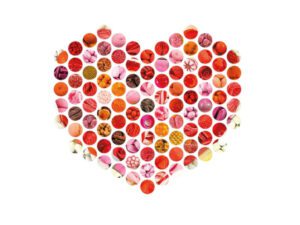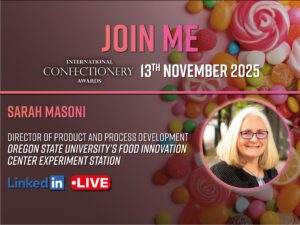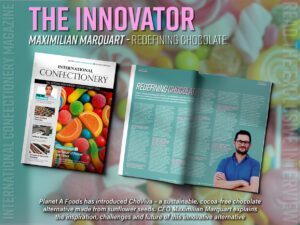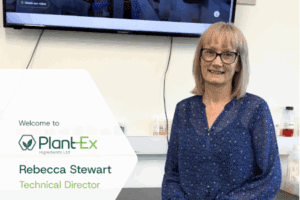International Confectionery converses with Markus Rustler, the CEO of Theegarten-Patec and recently elected Chairman of interpack 2023, to discuss the company’s developments and more.
As the packaging industry begins to develop, one company has continually remained at the forefront of packaging machinery. Innovation. Having been founded in Germany in 1934 as, “Rose-Theegarten,” Theegarten-Patec has an extensive and proud history that has allowed the company to become globally renowned. The business produces packaging machines and complete packaging systems for bite-sized confectionery products, other foods, and non-food items. To this end, in 2008 the company saw Markus Rustler appointment as the CEO of Theegarten-Patec, replacing his father in the family business. He has remained in that position since then, nearing 14 years.
Markus is an expert in the industry who truly needs no introduction as his acquired extensive knowledge on business management and machine processing has made him a very well-respected figurehead in the sector. Further proving this is his recent appointment as the Chairman of interpack 2023 will allow him to oversee the biggest event in the packaging sector. With all that being said, International Confectionery had the privilege to sit down with Markus to discuss how Theegarten-Patec has adapted to the pandemic, the company’s continual growth, and the latest machines the company will present at ProSweets.
- It is fair to say that COVID-19 has impacted many businesses. How would you say your company responded to the all the challenges that the Pandemic is providing, especially with the recent Omicron variant?
Even before the epidemic, we were already digitalized in a way that our employees from the office area could work “remotely”. Thus, the now necessary relocation of activities out of the office was easy to handle. The production and assembly of our machines and the corresponding spare parts can of course not be manufactured outside the factory. In order to minimize the risk of infection, we strictly observe the applicable hygiene regulations and have introduced various shift models. This means that employees work at their respective workplaces at different times. In doing so, we can guarantee the fastest possible delivery of spare parts and service in these difficult times, but also the completion and prospective delivery of new packaging machines and systems can be ensured, while minimizing the risk for our employees and their families.
Like many other companies, we have for years been working with the possibility to solve emergencies at our customers’ sites via remote access and web conferencing. What is really new since the crisis is that we have managed complete start-ups via these methods without any of our employees having to travel to the site of installation. This has happened with installations in Colombia, Nigeria, Russia and many other parts of the world.
Our focus since the outbreak of the crisis has been a little less on selling new machines. We are aware that our customers are going through a difficult phase, just as we are. In this situation, strategic investments are somewhat out of focus and they are concentrating on keeping the current production running. This is exactly where we try to help our customers by maintaining our spare parts service and technical support during the pandemic. And sometimes it doesn’t work without our employees on site. Wherever we can travel, our service engineers do so to help on site. For this purpose, they also accept and have to deal with long quarantine rules in order to assist the customers.
2. Could you potentially argue that the pandemic brought about some benefits to your company?
Definitely not. In general, there is always the argument that digitalization has been given a boost by the Pandemic and that this is an advantage. That is definitely true and also applies to Theegarten-Pactec to a certain extent. But since we had already been working on these issues and strategic plans were in place, the impact was not quite so significant. Rather, like many others, we are working every day to keep the negative impact of the pandemic on our company as low as possible and to protect our employees. We have succeeded quite well so far and will continue to do so in the future.
3. How do you believe that packaging industry has adapted or changed due to the pandemic and the increasing demand for more hygiene packaging?
The packaging industry is always in the spotlight when it comes to sustainability. There are now concepts that generally call packaging into question. The pandemic has just shown that packaging not only has an aesthetic and sales-promoting background, but primarily serves to protect the product and also guarantees hygienic conditions.
However, the necessity of packaging is no reason not to work on saving it. We have always made our contribution to this. Our machines are constantly being developed to process thinner and thinner materials, for example. Or also the processing of so-called mono-packaging materials, i.e. packaging materials made of only one material, which are therefore easier to recycle. Last but not least, we are working with packaging material suppliers on the use of paper-based materials for the most diverse traditional packaging styles.
4.In such a competitive industry how would you say your machines stand out compared to your competitors’?
It has been a continuous discussion over the last years that the modular design of packaging equipment is getting more and more essential due to shorter product life cycles and of course, the increased amount of seasonal production. This is why we started to design and build modular machines at least 15 years ago and the new CHS represents the steps towards this goal, because it really unites all used wrapping styles for chocolate articles in today’s industry into one machine. With the CHS, we deliver high-speed convenience which still combines all the benefits from easy change over between product geometry and wrapping styles.
At Pro Sweets we will present CHS with the challenging packaging style envelope fold. Small chocolate pralines are packed with the CHS at up to 1600 pieces per minute.
5. How does Theegarten stay ahead of the curve?
Fortunately, we rely on the brilliant ideas of the expert engineers, which we have here in house. One in four of our staff works in the area of design engineering/development. Two thirds of this team are engineers. All of them work in design engineering for customer orders as well as development.
And then of course the request from customers telling us which direction we should focus on and in the end, finding a good concept that brings benefits to the industry and to the customers.
6. What do you think Theegarten will be focusing on in the future, and what will be the next growing trend in the packaging sector?
The trends that we recognise are efficiency, flexibility/seasonal production, adaptability and product safety. Efficiency is something we have been working on for a long time and a characteristic that our customers really respond to. We always want to provide machinery that gives customers a quick return on their investment. In terms of flexibility, life cycles of products are much shorter nowadays which means machines need to be able to adapt quickly to produce say chocolate products in Top Twist for two or three month and then in Double Twist wrapping style for the next months. Our machines have that capability, even for seasonal production.
Finally, product safety has become increasingly important for clients. Regions like South East Asia are subjected to demanding climatic conditions. That is why protective packaging is continually gaining in importance here. This means packaging which not only looks nice but, for instance, also seals the product hermetically and thereby protects it optimally. This type of packaging is particularly important in regions of the world where heat, humidity or insect infestation prevail, such as in countries of the tropical climate zone. This is why we are currently working on being able to offer other attractive types of packaging with these protective properties, besides the pillow pack.
7. ProSweets is one of the industry’s biggest events, what is Theegarten hoping to achieve by attending and exhibiting in Cologne?
First and foremost, of course, we hope to be able to meet our partners and customers in person again, although the conditions are complicated. The successful Gulfood Manufacturing in Dubai in November showed again how important personal contact and dialogue is.
8. Markus, you were recently assigned as the President of Interpack 2023. Can you please describe what this achievement means for you, and Theegarten?
First of all, I am grateful for the trust placed in me by the appointment as interpack President.
interpack is definitely the world’s leading trade fair for the packaging- and the related process industry. Every three years the entire world-wide industry comes together in Dusseldorf to meet. Packaging technology is somewhat subject to the three-year cycle of the trade fair in terms of research and development. The exhibitors always work towards presenting new innovations and developments at this trade fair.
However, the work of interpack is not limited to this one-week trade fair every three years in Dusseldorf. In the years in between, there are many forums that discuss and work on trends and topics in the packaging industry. Being involved in shaping this process and staying in contact with all the companies involved is also part of the motivation for me to take on the role of interpack President.
Media contact
Roshini Bains,
Editor, International Confectionery
Tel: +44 (0) 1622 823 922
Email: [email protected]









